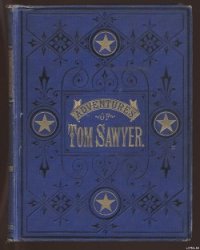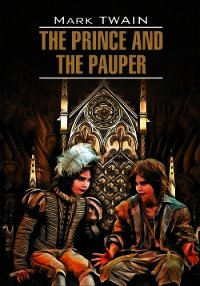Английский язык с Марком Твеном. Принц и нищий (Mark Twain. The Prince and the Pauper) - Twain Mark (читать хорошую книгу полностью .txt) 📗
He often read the priest's old books and got him to explain and enlarge upon them. His dreamings and readings worked certain changes in him by and by. His dream-people were so fine that he grew to lament his shabby clothing and his dirt, and to wish to be clean and better clad. He went on playing in the mud just the same, and enjoying it, too; but instead of splashing around in the Thames solely for the fun of it, he began to find an added value in it because of the washings and cleansings it afforded.
Tom could always find something going on (Том мог всегда найти что-нибудь происходящее; to go on — происходить, продолжать) around the Maypole in Cheapside (вокруг майского шеста в Чипсайде), and at the fairs (и на ярмарках); and now and then he and the rest of London (и время от времени: «теперь и тогда» он и остальные лондонцы: «из Лондона») had a chance to see a military parade (имели шанс увидеть военный парад) when some famous unfortunate (когда какой-нибудь известный неудачник) was carried prisoner to the Tower (перевозился, (как) заключенный, в Тауэр; to carry — нести), by land or boat (по земле или в лодке). One summer's day he saw (в один летний день он видел) poor Anne Askew and three men burned at the stake (бедную Анну Эскью и трех человек, сожженных на костре; stake — здесь: столб, к которому привязывали сжигаемого) in Smithfield (в Смитфилде), and heard an ex-bishop preach a sermon (и слышал (как) бывший епископ читал проповедь; to preach — проповедовать) to them (им) which did not interest him (чтo не заинтересовало его). Yes, Tom's life was varied (да, жизнь Тома была разнообразная) and pleasant enough (и довольно приятная), on the whole (в целом).
By and by Tom's reading and dreaming about princely life (тем временем чтение и мечтание Тома о роскошной, царской жизни) wrought such a strong effect upon him (оказала такое сильное воздействие на него; wrought — устаревшее прошедшее время от work) that he began to act the prince, unconsciously (что он начал играть принца, бессознательно). His speech and manners became curiously ceremonious and courtly (его речь и манеры стали странно церемонны и учтивы), to the vast admiration and amusement of his intimates (к широкому = большому восхищению и забаве его закадычных друзей). But Tom's influence (но влияние Тома) among these young people (среди этих молодых людей) began to grow now, day by day (начало расти теперь день ото дня); and in time (и со временем) he came to be looked up to by them with a sort of wondering awe (на него стали смотреть с чем-то вроде удивленного благоговения), as a superior being (как на высшее существо). He seemed to know (он, казалось, знает; to seem — казаться) so much (так много)! and he could do such marvellous things (и он мог делать такие удивительные вещи)! and withal (и к тому же), he was so deep and wise (он был такой глубокий = загадочный и мудрый)! Tom's remarks and Tom's performances (высказывания и поступки Тома; remark — замечание; performance — исполнение) were reported (пересказывались) by the boys to their elders (мальчиками их старшим); and these, also (и эти тоже), presently began to discuss Tom Canty (теперь начали обсуждать Тома Кэнти), and to regard him (и рассматривать его) as a most gifted and extraordinary creature (как самое = в высшей степени одаренное и необыкновенное существо). Full-grown people (взрослые: «полностью выросшие» люди) brought their perplexities (шли со своими трудностями: «приносили свои проблемы») to Tom for solution (к Тому за решением), and were often astonished (и бывали часто поражены) at the wit and wisdom (остроумию и мудрости) of his decisions (его решений). In fact (на самом деле), he became a hero to all who knew him (он стал героем для всех, кто знал его) except his own family (кроме его собственной семьи) — these only saw nothing in him (эти только = только они (не) видели ничего в нем).
Privately (про себя: «частным образом»), after a while (спустя некоторое время), Tom organized a royal court (Том организовал = придумал королевский двор)! He was the prince (он был принцем); his special comrades were guards (его лучшие товарищи были стражниками), chamberlains (камергерами), equerries (конюшими), lords and ladies in waiting (лордами и леди при дворе; waiting — ожидание), and the royal family (и королевской семьей). Daily the mock prince (ежедневно мнимый принц) was received (бывал принят) with elaborate ceremonials (с тщательно разработанным церемониалом) borrowed (заимствованным) by Tom from his romantic readings (Томом из своего романтического чтения); daily the great affairs of the mimic kingdom (ежедневно великие = важные дела притворного = вымышленного королевства) were discussed in the royal council (бывали обсуждаемы в королевском совете), and daily his mimic highness (и ежедневно его мнимое высочество) issued decrees (издавало декреты) to his imaginary armies (своим воображаемым армиям), navies, and viceroyalties (флотам и заморским владениям).
unfortunate [An`fO:tS?n?t], unconsciously [An`kOnS?sl?], creature [`kri:tS?]
Tom could always find something going on around the Maypole in Cheapside, and at the fairs; and now and then he and the rest of London had a chance to see a military parade when some famous unfortunate was carried prisoner to the Tower, by land or boat. One summer's day he saw poor Anne Askew and three men burned at the stake in Smithfield, and heard an ex-bishop preach a sermon to them which did not interest him. Yes, Tom's life was varied and pleasant enough, on the whole.
By and by Tom's reading and dreaming about princely life wrought such a strong effect upon him that he began to act the prince, unconsciously. His speech and manners became curiously ceremonious and courtly, to the vast admiration and amusement of his intimates. But Tom's influence among these young people began to grow now, day by day; and in time he came to be looked up to by them with a sort of wondering awe, as a superior being. He seemed to know so much! and he could do such marvellous things! and withal, he was so deep and wise! Tom's remarks and Tom's performances were reported by the boys to their elders; and these, also, presently began to discuss Tom Canty, and to regard him as a most gifted and extraordinary creature. Full-grown people brought their perplexities to Tom for solution, and were often astonished at the wit and wisdom of his decisions. In fact, he was become a hero to all who knew him except his own family — these only saw nothing in him.
Privately, after a while, Tom organized a royal court! He was the prince; his special comrades were guards, chamberlains, equerries, lords and ladies in waiting, and the royal family. Daily the mock prince was received with elaborate ceremonials borrowed by Tom from his romantic readings; daily the great affairs of the mimic kingdom were discussed in the royal council, and daily his mimic highness issued decrees to his imaginary armies, navies, and viceroyalties.
After which he would go forth in his rags (после чего он шел дальше в своих лохмотьях) and beg a few farthings (и выпрашивал несколько фартингов), eat his poor crust (сухари), take his customary cuffs and abuse (принимал обычные затрещины и брань), and then stretch himself upon (и затем растягивался на) his handful of foul straw (своем клочке грязной соломы), and resume his empty grandeurs (возобновлял свои пустые великолепия) in his dreams (в своих мечтах).
And still his desire to look just once upon a real prince (и все же его желание взглянуть лишь один раз на настоящего принца), in the flesh (во плоти), grew upon him (усиливалось в нем; to grow — расти), day by day (день ото дня), and week by week (и с каждой неделей), until at last it absorbed (пока наконец оно (не) вобрало в себя) all other desires (все прочие желания), and became the one passion of his life (и стало одной-единственной страстью его жизни; to become — становиться).




